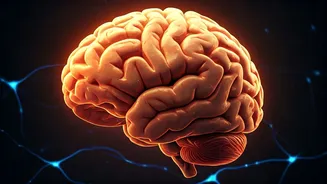Brain's Exercise Boost
Regular physical activity significantly enhances brain health, and that's not just a statement; it's a scientifically backed fact. When you engage in exercise,
your brain gets a surge of benefits that work on multiple levels. It triggers the release of neurotrophic factors, the most prominent being Brain-Derived Neurotrophic Factor (BDNF), often called 'brain fertilizer'. BDNF is crucial for the survival and growth of nerve cells. Engaging in regular exercise, like brisk walking, jogging, or even dancing, promotes BDNF production. This, in turn, boosts neuroplasticity, the brain's ability to reorganize itself by forming new neural connections throughout life. This is the cornerstone of improved memory and learning. Furthermore, exercise reduces inflammation in the brain, creating a healthier environment for neurons to function optimally. This proactive approach strengthens your cognitive abilities.
BDNF's Powerful Role
Brain-Derived Neurotrophic Factor (BDNF) acts as a guardian and a growth stimulator for your brain cells. Imagine it as a fertilizer that nurtures brain cells, helping them to thrive, grow, and connect. Exercise stimulates the production of BDNF, which supports the survival of existing neurons and encourages the creation of new ones. This process, known as neurogenesis, is vital for maintaining cognitive function throughout life. BDNF also protects neurons from damage, acting as a shield against the negative effects of stress and aging. By enhancing BDNF levels through exercise, individuals can improve their memory, enhance learning capabilities, and potentially slow down the cognitive decline often associated with aging. Essentially, BDNF promotes brain health on multiple fronts, making exercise a powerful ally in the battle to keep the mind sharp.
Neuroprotection Unveiled
Neuroprotection is a critical process where the brain defends itself against damage and degeneration, and exercise plays a key role in enhancing it. Regular physical activity reduces inflammation in the brain, a major contributor to neurodegenerative diseases. This reduction in inflammation creates a healthier environment for brain cells. Moreover, exercise improves blood flow to the brain, providing neurons with essential nutrients and oxygen. Enhanced blood flow is like ensuring your brain has a steady supply of fuel, allowing it to function at its best. Beyond these benefits, exercise can also stimulate the release of other protective substances, further fortifying the brain's defenses. Exercise has the ability to shield the brain from harm, making it a powerful strategy for maintaining long-term cognitive well-being.
Types of Exercises
A variety of exercises can boost brain health. Aerobic exercises, like running, swimming, or cycling, are particularly effective. These activities increase blood flow to the brain, which is essential for supplying it with oxygen and nutrients. Strength training, such as weightlifting or bodyweight exercises, is also beneficial. It can stimulate the release of BDNF, contributing to improved cognitive function. Even low-impact activities like walking, yoga, and tai chi are valuable, as they improve overall cardiovascular health and reduce stress. The key is to find activities you enjoy and can consistently incorporate into your routine. Consistency is crucial, so aim for at least 30 minutes of moderate-intensity exercise most days of the week. Varying your workouts can also provide the brain with new challenges, further enhancing its ability to adapt and grow.
Exercise's Memory Boost
Exercise significantly enhances memory by impacting various brain regions. First, it boosts blood flow to the hippocampus, a critical area for memory formation. Increased blood flow ensures this region gets the necessary nutrients and oxygen to function effectively. Regular exercise promotes the growth of new neurons in the hippocampus, boosting its capacity to store and retrieve memories. Secondly, exercise increases the production of BDNF, which supports the survival and growth of brain cells. This supports neuroplasticity, enhancing the brain's ability to adapt and form new connections, leading to improved memory recall. Additionally, exercise can reduce stress and improve sleep quality, both essential for solidifying memories. Through these multiple mechanisms, exercise helps create stronger memories and improve overall cognitive function.
Exercise As Therapy
Exercise is a non-medical approach to brain health, offering significant therapeutic benefits. Physical activity can serve as a supportive tool for individuals dealing with mild cognitive impairment or early stages of neurodegenerative diseases. Exercise can enhance cognitive function and improve mood, providing a natural way to reduce symptoms. Unlike traditional therapies, exercise has minimal side effects and can be tailored to individual needs and abilities. It's accessible and enjoyable. The focus is on promoting brain health, reducing stress, and improving overall well-being. Regular exercise routines can improve mental clarity and enhance the ability to think and function, making it a simple yet effective strategy for supporting brain health.




















